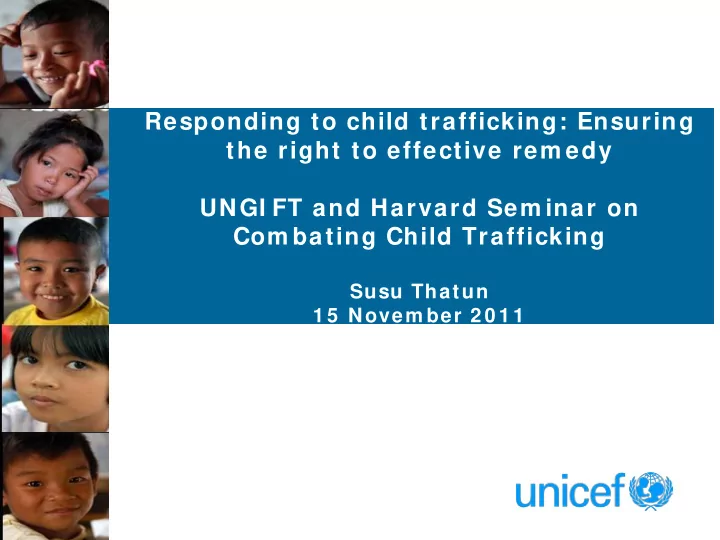

Responding to child trafficking: Ensuring the right to effective rem edy UNGI FT and Harvard Sem inar on Com bating Child Trafficking Susu Thatun 1 5 Novem ber 2 0 1 1
Effective response to child trafficking Guiding principles of the CRC when working with a trafficked child : • The best interests of the child is the primary consideration • Every child without any discrimination shall have the right to protection • The right of the child to participate meaningfully in matters affecting him/her • Right to life survival and development See: Guidelines on the Protection of Child Victims of Trafficking ( http://www.unicef.org/ceecis/0610-Unicef_Victims_Guidelines_en.pdf ) 2
Effective remedy The right to effective remedy involves substantive right to reparations and procedural rights necessary to access reparations • In substance, it includes restitution, compensation, recovery, satisfaction and guarantees of non-repetition • Procedural rights include measures and mechanisms that allow for access to substantive remedies including – Provision of information concerning their rights; the reparations that are available and the mechanisms – Legal, medical, psychological, social, administrative and other assistance – A reflection and recovery period Effective remedy is not just right in principle but also right in practice! 3
Effective remedy in practice: The case of Thida • 16 year old girl from Myanmar rescued from brothel and placed in shelter in Bangkok • Several weeks to build rapport before trust was built • Discussed hopes, fears and plans of going home • Criminal case against the brothel owner – successful prosecution; compensation awarded • Positive family tracing and assessment • Repatriation & (re)integration and ongoing assistance • Regular follow up (monitoring) • Assessment a year later – A peer educator actively working to spread knowledge of trafficking – From a victim to a survivor to a youth leader working to prevent trafficking 4
Take away… on good practices When the response is done right: - – treated as individual with appropriate care – health, psycho-social support (placement in alternative care should be for the shortest possible time) ; – with respect – information provided and in the child’s language; – given time to reflect and recover; – listened to and space to actively participate – the best interests taken fully into account – When family, community and relevant persons are involved – When monitoring ensures that support is in place – When those working with (child) victims are well trained – When systems and structures are in place and when attitudes leave no place for stigma… We get a durable solution where the sum is greater than its parts! 5
Thank you 6
Recommend
More recommend